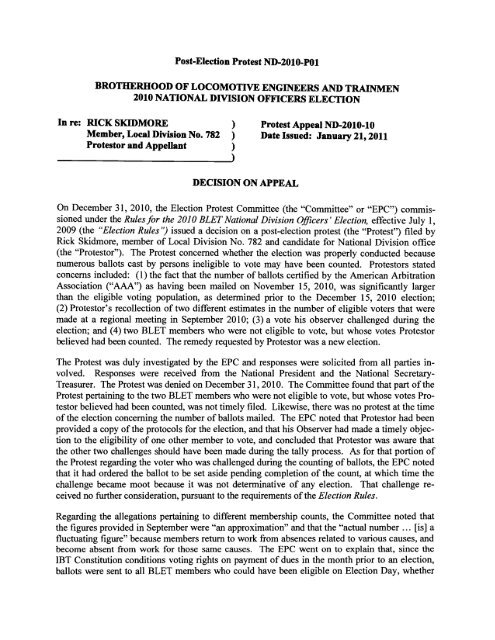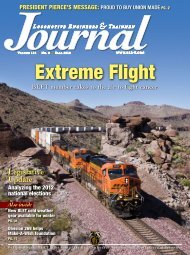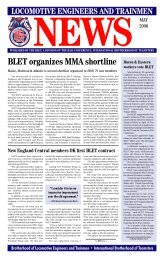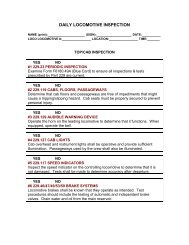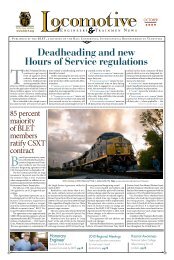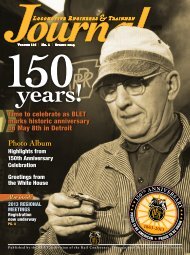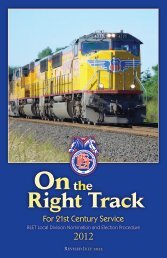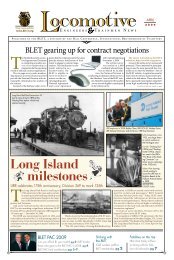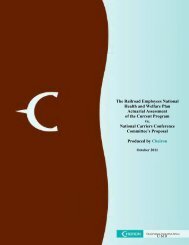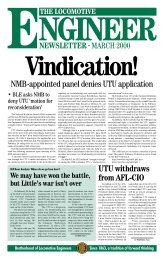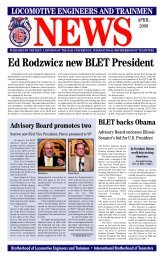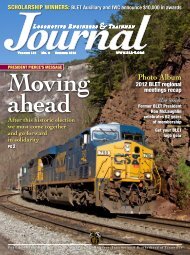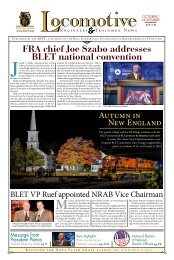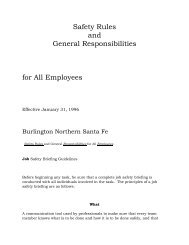Advisory Board Decision ND-2010-10, Issued January 21, 2011
Advisory Board Decision ND-2010-10, Issued January 21, 2011
Advisory Board Decision ND-2010-10, Issued January 21, 2011
Create successful ePaper yourself
Turn your PDF publications into a flip-book with our unique Google optimized e-Paper software.
Post-Election Protest <strong>ND</strong>-<strong>20<strong>10</strong></strong>-POIBROTHERHOODOFLOCOMO~ENG~ERSA<strong>ND</strong>T~N<strong>20<strong>10</strong></strong> NATIONAL DIVISION OFFICERS ELECTIONIn re: RICK SKIDMORE ) Protest Appeal <strong>ND</strong>-<strong>20<strong>10</strong></strong>-<strong>10</strong>Member, Local Division No. 782 ) Date <strong>Issued</strong>: <strong>January</strong> <strong>21</strong>, <strong>2011</strong>Protestor and Appellant ))DECISION ON APPEALOn December 31, <strong>20<strong>10</strong></strong>, the Election Protest Committee (the "Committee" or "EPC") commissionedunder the Rulesfor the <strong>20<strong>10</strong></strong> BLET National Division Officers' Election, effective July I,2009 (the "Election Rules") issued a decision on a post-election protest (the "Protest") filed byRick Skidmore, member of Local Division No. 782 and candidate for National Division office(the "Protestor"). The Protest concerned whether the election was properly conducted becausenumerous ballots cast by persons ineligible to vote may have been counted. Protestors statedconcerns included: (I) the fact that the number of ballots certified by the American ArbitrationAssociation ("AAA") as having been mailed on November 15, <strong>20<strong>10</strong></strong>, was significantly largerthan the eligible voting population, as determined prior to the December 15, <strong>20<strong>10</strong></strong> election;(2) Protestor's recollection of two different estimates in the number of eligible voters that weremade at a regional meeting in September <strong>20<strong>10</strong></strong>; (3) a vote his observer challenged during theelection; and (4) two BLET members who were not eligible to vote, but whose votes Protestorbelieved had been counted. The remedy requested by Protestor was a new election.The Protest was duly investigated by the EPC and responses were solicited from all parties involved.Responses were received from the National President and the National SecretaryTreasurer. The Protest was denied on December 31,201 O. The Committee found that part oftheProtest pertaining to the two BLET members who were not eligible to vote, but whose votes Protestorbelieved had been counted, was not timely filed. Likewise, there was no protest at the timeof the election concerning the number of ballots mailed. The EPC noted that Protestor had beenprovided a copy ofthe protocols for the election, and that his Observer had made a timely objectionto the eligibility of one other member to vote, and concluded that Protestor was aware thatthe other two challenges should have been made during the tally process. As for that portion ofthe Protest regarding the voter who was challenged during the counting of ballots, the EPC notedthat it had ordered the ballot to be set aside pending completion of the count, at which time thechallenge became moot because it was not determinative of any election. That challenge receivedno further consideration, pursuant to the requirements ofthe Election Rules.Regarding the allegations pertaining to different membership counts, the Committee noted thatthe figures provided in September were "an approximation" and that the "actual number ... [is] afluctuating figure" because members return to work from absences related to various causes, andbecome absent from work for those same causes. The EPC went on to explain that, since theIBT Constitution conditions voting rights on payment of dues in the month prior to an election,ballots were sent to all BLET members who could have been eligible on Election Day, whether
or not they may ha~e b~en .eligibl.e on the day the ballots were mailed. This explanation wassupported by extensIve CItatIOn to Internal BLET law and interpretations thereof by the NationalPresident.Thereafter, on <strong>January</strong> 11,<strong>2011</strong>, the National Division received an appeal of the EPC's decisionin Post-Election Protest No. <strong>ND</strong>-201 O-POI. Protestor asserted that the EPC "made several errorsand failed to render a fair decision based on the evidence presented." Protestor also cited to "additi?nalevidence" he purportedly obtained from his Election Observer following the EPC'sdemal ofthe Protest. He also claimed that additional unanswered questions had arisen as a resultofthe Committee's ruling, and requested the complete listing of ineligible persons who had beensent a ballot. Protestor again raised the issue of two persons who had received ballots and believedtheir votes had been counted, providing an affidavit from one of those persons certifyingsame. Lastly, Protestor argued that the absence from the "ineligible list" ofthe individual whoseballot his Observer challenged was evidence that ineligible persons had voted. National PresidentPierce, National Secretary-Treasurer Walpert and Vice President Ruef are "involved" membersin this appeal; they recused themselves and did not participate in any discussions,deliberations, or the decision issued by the <strong>Advisory</strong> <strong>Board</strong> in this matter.As required by Article X, Section 2(i) of the Election Rules, Protestor's appeal was received on<strong>January</strong> 11, <strong>2011</strong>, within forty-eight (48) hours ofissuance ofthe EPC decision. For this reason,we find that Protestor Skidmore's appeal is timely filed under the Election Rules, and appropriatefor consideration on its merits. The <strong>Advisory</strong> <strong>Board</strong> has considered his three-page submissionand the four exhibits appended thereto, and has reviewed the documentation available to, andreviewed by, the EPC in rendering its decision. That documentation included, but is not limitedto, previous submissions by: (i) the Protestor; (ii) the National President; and (iii) the NationalSecretary-Treasurer. After due deliberation, the <strong>Advisory</strong> <strong>Board</strong> has determined that a hearingunder Article X, Section 2(k) is not necessary or warranted, and that a decision may be renderedon the record evidence available in this case.In Protest Appeal <strong>ND</strong>-201O-0IA, captioned In re: J.M Karakian and issued August 13,<strong>20<strong>10</strong></strong>, the<strong>Advisory</strong> <strong>Board</strong> posited the standard ofreview of EPC decisions on pre-election protests. In relevantpart, we stated "Unless there is error shown in any EPC decision, or it has otherwise actedin an arbitrary, capricious or discriminatory manner, we will be hard pressed to disturb EPC findingsand conclusions reached in any particular case."} We have employed the same standard ofreview in all subsequent EPC decisions appealed to this body.2 Pre-election protests and postelectionprotests are distinguishable from one another because the former involves activity priorto an election, while the latter involves activity during or after an election. Therefore, the samestandard ofreview is appropriate.BLET Protest Appeal <strong>ND</strong>-<strong>20<strong>10</strong></strong>-01A, In re: J.MKarakian, issued August 13,<strong>20<strong>10</strong></strong>, p. 3.2 See BLET Protest Appeal <strong>ND</strong>-201O-02A, In re: S. Brandenburg, dated August 24, <strong>20<strong>10</strong></strong>, p. 5;BLET Protest Appeal <strong>ND</strong>-201O-03, In re: David A. Bowen, dated October 8, <strong>20<strong>10</strong></strong>, p. 3; Protest Appeal<strong>ND</strong>-<strong>20<strong>10</strong></strong>-04, In re: Rick Skidmore, dated October 26, <strong>20<strong>10</strong></strong>, p. 3; Protest Appeal <strong>ND</strong>-<strong>20<strong>10</strong></strong>-05, In re:D. R. Pierce, dated November 30,<strong>20<strong>10</strong></strong>, p. 3; Protest Appeal <strong>ND</strong>-201O-06, In re: D. R. Pierce, dated December3, <strong>20<strong>10</strong></strong>, p.3; and Protest Appeal <strong>ND</strong>-<strong>20<strong>10</strong></strong>-07, In re: C. R. Rightnowar, dated December 15,<strong>20<strong>10</strong></strong>, p. 3.2
The 7-page decision ofthe Committee in this matter provided, in our view, a complete recitationof relevant findings of fact, and a detailed analysis of Protestor's complaints. The Committeealso.correctly .focused. on, as a threshold issue, the Protestor's knowledge of the underlying factsof ~s complamts, WhIC? he acknowledg~ were known well before his filing of the Protest. Inour Judgment, the ElectIOn Protest CommIttee correctly applied the clear time limits set forth inArticle X, Section 2(b) of the Election Rules to the undisputed facts of the case and concludedthat the ballot challenges were not timely filed.Upon consideration of the record in this matter, the <strong>Advisory</strong> <strong>Board</strong> observes that Protestor hasprovided no new or additional evidence that could serve as a basis for reversing the decision ofthe EPC as to any element ofthe Protest. We find as follows:I. With respect to the individual whose ballot was timely challenged by Protestor's Observer,it must be noted that the EPC accepted that challenge, and the ballot was never openedor included in the count. That individual was not allowed to vote in the election and allfurther protests concerning him are moot. For the record, however, he is reported by hislocal division as being an active member and he was current on his dues obligation bothwhen the ballots were mailed and when they were counted. The status of every memberin our system is based upon the information and dues reports received from every division.The division did not report the individual as disabled, nor have they removed himfrom membership for any other reason. That is why he was sent a ballot. Protestor's appealcenters on whether or not he should be eligible to be a member, which is a differentquestion entirely from whether or not he was eligible to vote. He also refers to and confiatesan Election Rules <strong>Advisory</strong> ("ERA") pertaining to eligibility to be nominated andrun for office as support for his assertion that such a member is not eligible to vote. Eligibilityto run for office and eligibility to vote are subject to two different rules and standardsand cannot be compared. The ERA requirements pertaining to eligibility to run foroffice have never been applied to eligibility to hold membership or to vote.2. With respect to the concern voiced over the number of "ineligible" members who receivedballots, the responses to the EPC from the National President and National Secretary-Treasurermake clear that the process employed was to send ballots to all members(approximately 36,000), irrespective of whether each was current on his or her dues. Becauseeligibility to vote is dependent upon being current on dues for the month prior tothe election, rather than the month prior to when the ballots were mailed, it was known inadvance that many ballots were sent to members who ultimately might be determined tobe ineligible to vote. Not knowing which of the 36,000 would fall into that category, thedecision was made to mail ballots to everyone who could be eligible. A copy of the "ineligiblelist" was made available to all observers during the ballot count. The 800 ballotsthat were returned from ineligible voters were set aside and not counted in the election.As a matter of fact, a review of that list shows that the two inactive members as to whomProtestor now sends additional information were on the ineligible list and their ballotswere not counted in the election. Thus, the assumption stated in the affidavit provided byProtestor that their ballots were counted is erroneous.3. The record shows that the process developed and implemented by the National Divisionwas in compliance with the requirements of Section 49 - National Division Rules of the3
BLET Bylaws, which itself is derived from Division 316' s initiative. Review of the dataprovided by Protestor as compared to the data used to determine eligibility show that thesystem as applied worked as intended and no violation ofthe rules occurred.Based upon the foregoing, in our judgment the EPC's decision is not erroneous, and the Committeedid not otherwise act in an arbitrary, capricious or discriminatory manner with respect to theprotest. Its decision should be, and hereby is, affirmed in all respects. Accordingly, the appealofthe EPC's decision in Post-Election Protest No. <strong>ND</strong>-201O-POl is hereby DENIED.The foregoing was DECIDED A<strong>ND</strong> ORDERED effective, this <strong>21</strong> st day of<strong>January</strong>, <strong>2011</strong>.BLET ADVISORY BOARD, by:First Vice President and Alternate National President4


